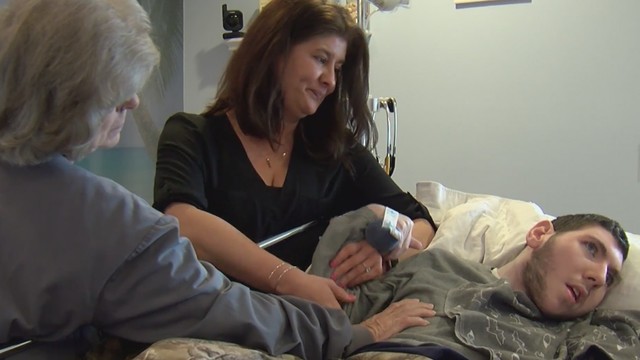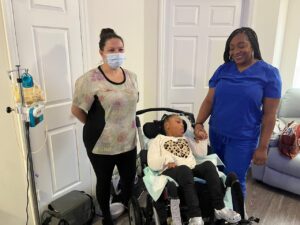Hagerstown, MD mother Kimberley Lanham needs skilled nursing care to keep her son at home, but she—and many—are struggling to access the care they need.

We all know nurses as skilled, compassionate professionals that care for us when we are at our most sick and vulnerable. But for many families in Maryland and across the country, their care isn’t limited to a short hospital stay or recovery period. Instead, many individuals and families rely on skilled nursing care every day—and they aren’t getting it.
For individuals like Kimberley Lanham’s son Nathen, who was recently documented on Hagerstown, MD’s WVDM 25, skilled nursing means round-the-clock care. Nathen needs constant skilled medical attention in order to stay at home and grow up living in a safe and familiar environment with family and friends. The problem is, in many states, home care nurses simply aren’t available.
Why? Because home care nurses are often drawn to work in other settings and in surrounding states where they can earn more.
“Maryland’s nurses can make more in hospitals and skilled nursing facilities, and in nearly any surrounding state or Washington, DC. The care they’re providing requires a high level of skill that continues to increase. We need to pay these highly-skilled nurses the wages they deserve. With low Maryland Medicaid rates, we can’t. It’s not only affecting those nurses, but also those individuals that need their care to live with their families and out of residential institutions,” says BAYADA Director of Government Affairs Shannon Gahs.
Licensed Practical Nurse (LPN) Brenda White has been caring for Nathen for nearly 13 years and stays in home care despite knowing that she could make more elsewhere. “You’re doing everything for a patient that can’t do anything at all for themselves, and you wonder, why. Why are they getting paid more? They’re not doing half as what I’m doing,” she said.
In Maryland and in many other states, Medicaid reimbursement rates for home nursing services have fallen well below the cost of living, and home care providers can’t compete with hospitals and other settings that can pay higher wages.
“When nurses are being attracted to hospitals and nursing homes at the rate we are seeing, home care agencies simply can’t keep up. If the state were to allocate sufficient funding, then providers would be better able to recruit and retain the quality skilled nurses that they need, and families like Kimberley and Nathen’s wouldn’t be left in the lurch,” says Dawn Seek, Executive Director of the Maryland-National Capital Homecare Association (MNCHA).
Nathen has Cerebral Palsy and a seizure disorder that often requires emergency medicine, but his mother Kimberley can only access nursing coverage for a small fraction of the time that Nathen is authorized for. “Although I’m with a nursing agency, Optimal Health Care (OHC), they don’t have anyone to do the hours. Everyone is going to other facilities to work,” said Kimberley.
Hearts for Home Care members and other advocates are asking the state to increase the Medicaid reimbursement rate for home nursing care by 21% to put it back on track with wages that other settings and surrounding states can pay. However, currently, the state is only committed to a 3% increase. “It’s just not enough,” says Gahs. “While the state of Maryland has incrementally raised the rate by about 1-2% over the past decade, it has fallen way behind. 3% will not help us recruit and retain the nurses necessary to keep up with the demand, and families may even need to turn to other options. Providers, advocates, and families are looking for more.”
The good news is that, along with the Hagerstown coverage, the Baltimore Sun and Washington Post have also covered the growing crisis in Maryland over the past several months. Across the country, home care recipients, families, and advocates with the same issue are beginning to speak out to catch the ear of reporters and elected officials. While public awareness is increasing, moms like Kimberley are hoping that the governor’s and legislators’ eyes are also on the issue.
“It’s time for the state to do something. My son deserves to live at home, surrounded by his family and the things he loves. I’m already struggling. If I lost my nursing coverage even more, I may have to send him to a [nursing] home,” says Kimberley.
Join mothers like Kimberley and other advocates who are beginning to band their voices together in support of families’ increased access to home nursing care. To learn more about what you can do, contact [email protected] today.







